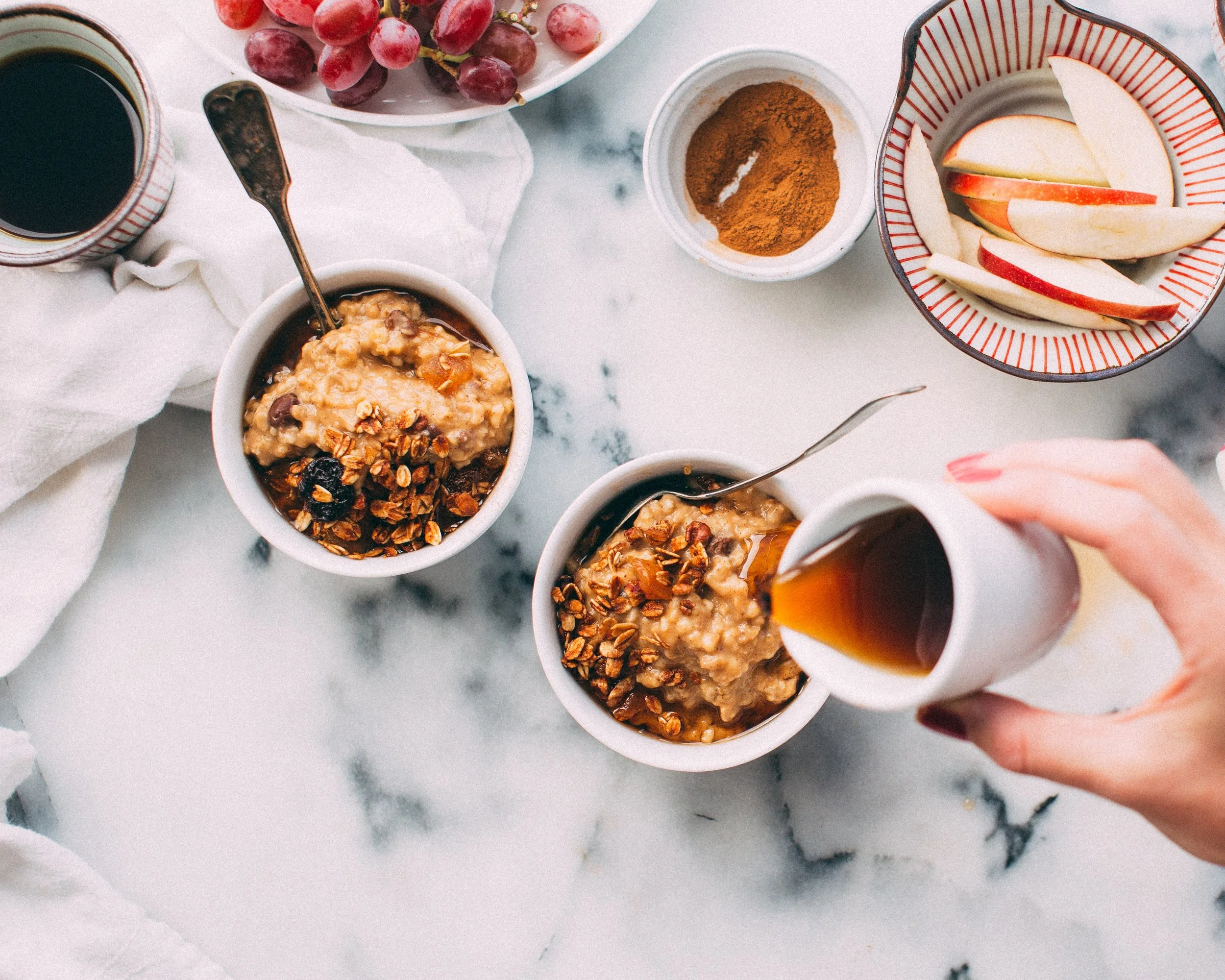Dinacharya for Summer
Daily Ayurveda Routine for Pitta season
Published in South Asian Woman Magazine July 2017
Ayurveda is one of the oldest, most unique and comprehensive medical systems in the world, allowing us to experience the deepest connection to nature both inside and outside of our own bodies.Ayurveda encourages us to live in harmony with nature to ensure optimal health during the changing seasons; therefore, each season has its own qualities and set of remedying principles to live by, including the times we wake up, sleep, eat, exercise, work and socialize.
Dinacharya in Sanskrit translates to “daily routine” and ritucharya is the seasonal routine, which is highly encouraged for each dosha (constitution type) and season to maintain a balanced state of mental, physical and emotional health. Summer in Ayurveda is known as the pitta season, which is composed of the fire and water elements, lasting from July to October (India has the monsoon season & in the west summer begins at the Summer Solistice). The qualities of pitta are known to be light, hot, sharp, penetrating, oily and fluid. Pitta element in the environment will be at its peak, affecting all of us, but those with a pitta dominant constitution will become more easily overstimulated and overheated. Overactive pitta dosha results in burning sensations, skin and digestive inflammation, irritability, jealousy, criticism, anger and explosive outbursts of a mental, physical or emotional nature; therefore, a cooling pitta-pacifying routine is ideal for all. The summer season has a certain feeling of lightness, playfulness and relaxation, which should be fully supported with a stress-free and balanced routine.
Morning
Since we have more hours of daylight during the summer season, the ideal time to wake up for pitta people is 5:30 in the morning. This may not be ideal for all of us living in the west; therefore, try waking up 15 minutes earlier than you did in spring each week, giving yourself seven to eight hours of restful sleep. Upon rising, make sure that you avoid reaching for your phone. At night only, keep it away from your bedside and on airplane mode in order to reduce the radiation and sleep disturbance. Instead, choose to sit up in your bed, practise a few moments of deep breathing and gratitude for this day, before you begin your daily hygiene practice.
Cleansing
After brushing your teeth with a nontoxic and fluoride-free toothpaste/powder, scrape your tongue with a stainless steel or, if you really want to be fancy, a silver-plated tongue scraper (silver has cooling properties). Scraping the tongue of the sticky white substance known as ama, or toxins from undigested food, is a vital health practice in Ayurvedic dinacharya. It kindles digestive fire, rids the body of stale toxic waste, helping with bad breath and bacteria, and promoting strong and clear taste buds. Splash the face with cool water and rinse the eyes with an eyewash made from organic rose petal water; ensure that the rose water is chemical free as it is going into your eyes and most commercially-made rose water will contain preservatives. Rose is the queen to cool pitta dosha with its sweet properties. It is highly encouraged to be used on the body and consumed as food during summer.
Next step for a healthy morning start is a glass of warm water with freshly squeezed lime juice. This encourages healthy elimination by flushing the digestive tract. Although lime is sour, it is alkalizing, cooling and anti-inflammatory, making it a good replacement for lemon during the summer months.
As it does every season, Ayurveda calls for abhyanga or self-massage. For summer, you can use cold-pressed organic coconut oil or sunflower oil. It can be done every day or at least 3-4 times a week to help blood circulation, to remove impurities from the body, relax and calm the nervous system, and help the skin stay hydrated, cool and soft. Leave the oil on the skin for at least 15-20 minutes; in that time, you can do some gentle yoga/breathing practices before bathing with cool water and a herbal soap where it is needed. Neem oil can also be used as an alternative to sunscreen after bathing and before sun exposure, as it is said to be naturally SPF 35.
After bathing, you can use cooling essential oils such as rose, jasmine, sandalwood, vetiver or lavender on the third eye point, heart, and crown of the head, which will help your nervous system stay calm throughout the day, while you stay smelling sweet.
Depending upon your belief system, if you prefer to offer your prayers to God after bathing the first thing in the morning, you can minimize the practices before bathing.
Exercise
The Ayurvedic philosophy states that exercise should be done to half your capacity and since the fire element is already high during summer, it is advised to keep exercise routine gentle and easy, not to overstimulate the internal fire. Best time to exercise is between six and 10 o’clock in the morning; after 10 o’clock in the morning, the pitta time of the day begins, and the fire energy should be reserved for digestion and bulk of your work tasks. Yoga is always a supportive way to introduce movement into the body; you can opt for 12 rounds of moon salutations, cat and cow pose, or camel, fish, cobra, boat and bow poses, while avoiding inverted poses. You can also opt for evening walks, especially on full-moon nights, which are very beneficial in calming pitta. Spending time walking and practising conscious breathing in the forest or forest bathing has immense benefits for the nervous and cardiovascular system.
Diet
Meal time has its specific place for each dosha and season. Summer time and pitta dosha call for breakfast between eight and 10 o’clock, lunch midday between noon and two o’clock, making this the main meal of the day as digestive fire is the most active at this time and lastly, dinner should be eaten around sunset or by seven o’clock, depending on your daily schedule.
Summer foods should favour more light, sweet, astringent and cooling foods that are fresh and organic as opposed to spicy, oily, fried and heavy food, which is difficult to digest and will increase the fire/water element in the body. This can result in uncomfortable swelling, irritation and inflammatory conditions, such as skin rashes, hives and blisters
Introduce fresh herbs, such as mint, coriander and tulsi (basil). Cook foods with organic cold-pressed coconut or sunflower oil, or fresh ghee (clarified butter), as much as possible. Opt for fresh and sweet fruit for snacks, such as red grapes, sweet cherry, pears, figs, sweet berries, pomegranate and melons. Sweet mango that has been soaked overnight can be taken in moderation. Remember that fruit should be eaten at least two hours apart from other foods to avoid creating more ama (toxic buildup) in the body. Drink plenty of water, and experiment with tasty and healthy drink recipes using coconut water, fresh cooling herbs, fruit juices and herbal teas, but avoid having processed and overly cold, sugary and creamy drinks, which will suppress the necessary digestive fire.
Rest
Summer is meant for relaxing and playing, but we can easily overexert ourselves while having fun. To conserve your energy, avoid being in direct sunlight between peak hours of noon and four o’clock. Avoid having afternoon naps if you can and instead, choose 20 minutes of sitting quietly in meditation and focusing on your breath, which will help cool and energize the body. Start winding down at least 30 minutes to bedtime and implement a similar nighttime routine as morning, with washing the face and the feet or a cool shower/ bath, brushing and flossing the teeth and of course, scraping the tongue. Power down your electronics and avoid scrolling and reading in bed as it overstimulates the brain, especially past 9:30 at night. Choose this time to contemplate your day, express gratitude, connect with your loved ones, write a journal or simply breathe. The summer heat often makes sleeping difficult. To aid in a more restful sleep, you can rub coconut oil with a few drops of lavender or Brahmi oil on the bottoms of your feet and top of your head before sleeping. It is best to be asleep between 10 and 11 o’clock at night to ensure that you get the most restful and splendid summer sleep.
Remember that nature is bountiful with sunlight, joy and freshness during this season; so take time from your regular routine to enjoy nature, to play and radiate!
xo
References
Lad, V., Dr. (n.d.). The Daily Routine. Retrieved July 07, 2017, from http://www.ayurveda.com/resources/articles/the-daily-routine
Lambert, J. M. (n.d.). Rutucharya- Seasonal Practices for "Going with the Flow" of Life. Ayurveda Seminars.
Mooney, S. (2016, March 18). Quick Look: A Traditional Ayurvedic Daily Routine. Retrieved July 07, 2017, from https://www.banyanbotanicals.com/info/blog-the-banyan-insight/details/dinacharya-balance-and-daily-routine/






